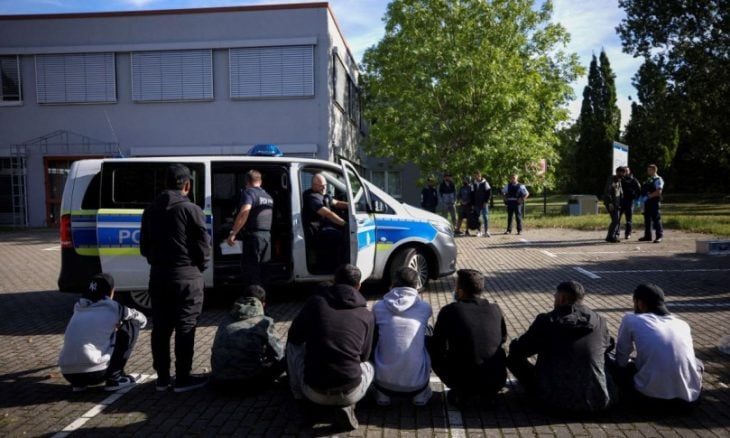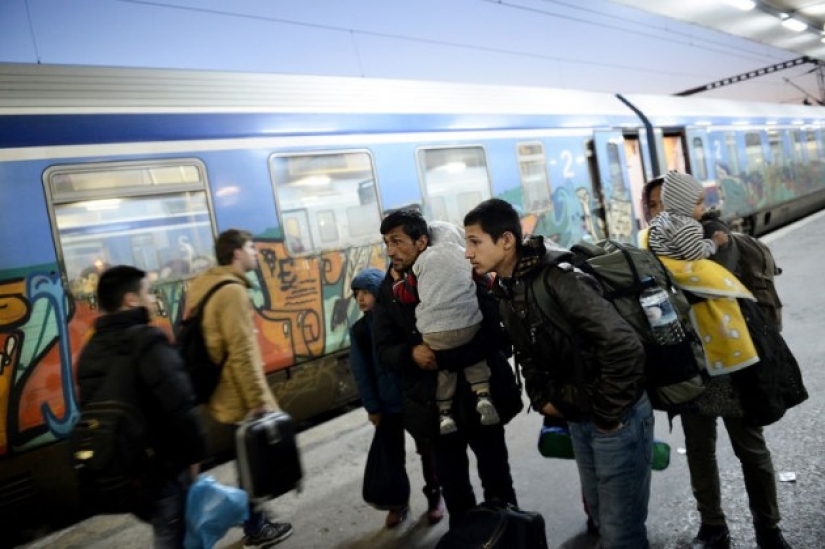Growing Influence: How the Far Right Has Succeeded in Pressuring European Countries to Curb Immigration

The rise of far-right ideologies in Europe strengthens anti-immigration sentiments.
The impact of the far-right's rise in Europe has begun to surface in recent local elections across several EU countries, particularly regarding tougher measures to curb immigration and the imposition of restrictions on asylum rights.
It has become evident that some European governments are making concessions on immigration, one of the most contentious issues facing the bloc, especially as support for anti-immigration parties grows across Europe.

Tightening Asylum Policies
Despite the adoption of a joint migration and asylum pact in mid-May 2024, many European countries have intensified measures to curb immigration and imposed restrictions on asylum rights, aligning themselves with far-right movements that continue to gain ground in Europe.
Under the pretext of addressing “emergencies” or “crisis” situations, exceptions to or deviations from the common rules set by the European Union are increasing.
This comes alongside the reintroduction of border controls in Germany, Italy's establishment of detention camps outside the EU, and Cyprus's suspension of asylum applications from Syrians.
Similarly, Finland and Lithuania have introduced laws allowing the return of asylum seekers at the border, while the Netherlands has threatened to withdraw from the European migration and asylum pact even before it takes effect in 2026.
The new migration and asylum pact represents the EU’s comprehensive reform, completed after nearly four years of difficult negotiations.
The pact, known as “mandatory solidarity,” offers countries three options for handling asylum applications: accommodating several asylum seekers, paying €20,000 for each rejected asylum claim, or providing financial support.
On the other hand, the European Commission insists that all member states must adhere to the current rules and that any exemptions must be negotiated before approval, not afterward.
In this context, the far-right Dutch government, led by anti-immigration figure Geert Wilders, called on September 18, 2024, for an official withdrawal from EU migration rules.
Dutch Immigration Minister Marjolein Faber, from Wilders' party, wrote to the European Commission stating that Amsterdam wishes to exit the regulations governing refugee admissions, claiming that otherwise, one of the world's wealthiest countries will struggle to provide public services.
“I have just informed the EU Commission that I want a migration opt-out within Europe for the Netherlands,” said Marjolein Faber.
“We need to be in charge of our asylum policy again!” she added.
Faber has been seeking to fulfill an electoral promise to drastically and swiftly reduce immigration in the country.
During the parliamentary debate on September 18, Wilders described the move as a “mini-next,” (Netherlands and exit), drawing parallels to the UK's 2020 Brexit from the EU.
In a letter to EU Commissioner for Home Affairs Ylva Johansson, Faber insisted that the government must significantly reduce migration to the Netherlands to continue fulfilling “our constitutional duties”—providing public housing, healthcare, and education.
Meanwhile, Wilders, leader of the far-right Freedom Party (PVV), has repeatedly called for the country to exit the EU during his three-decade-long career, although such a move is not currently part of any government plans.

Strict Conditions
In September, the Dutch government, which came to power in July 2024, announced its political plan for the coming year, including stricter policies to contain or expel migrants who are not eligible for asylum.
New figures released by the EU’s asylum agency in September 2024 show that 17,376 people applied for international protection in the Netherlands, a country with a population of 17.7 million, during the first half of 2024.
This number has remained relatively stable, representing around 3% of all applications in Europe, with most applicants coming from Syria, Iraq, or Turkiye.
This coincided with the Netherlands imposing new measures to reduce the number of refugees entering the country in mid-September 2024, after the ruling coalition, comprising four parties led by Prime Minister Dick Schoof, pledged to implement “the strictest asylum system in the country’s history.”
The Dutch government published its official program online, outlining the policies it will pursue over the next four years.
According to the government program, the Foreigners Act can be overridden, and parents are no longer allowed to reunite with their adult children over the age of 18. New facts and circumstances in repeat asylum applications will be evaluated with greater scrutiny.
There will also be an option to reject asylum seekers who fail to attend their hearings or appointments during the residence permit process.
Following the enactment of the Asylum Crisis Law, the government will withdraw the law distributing asylum seekers across municipalities, freeze decisions on asylum applications for two years, reduce reception capacity, and forcibly deport individuals without residence permits if necessary.
There will be strict conditions regarding family reunification—refugees will not be able to reunite with their families unless they have a home, a suitable income, and have resided in the country for at least two years.
Asylum seekers will no longer automatically receive an indefinite asylum permit after five years. This means they must return to their home country once the situation is deemed safe.
The government also stated that asylum seekers who commit crimes will be deported more swiftly.
In Germany, the states of Thuringia and Saxony experienced historic elections in early September 2024, shaking up both the domestic and European political landscape. The far-right, anti-immigration party Alternative for Germany (AfD) made significant gains in regional elections.
This followed the Solingen stabbing attack, which opened the door for the German government to introduce new asylum policies in a country that hosts the largest number of undocumented migrants in the world.
Three people were killed and eight injured on August 23, 2024, when a 26-year-old Syrian asylum seeker, whose application had been rejected, attacked a festival with a knife in Solingen, western Germany, during the city's anniversary celebration.

A Strong Message
In the case of Germany, the impact of two recent attacks carried out by individuals who “embraced extremism,” coinciding with the far-right Alternative for Germany (AfD) party’s victory in elections, pushed Olaf Scholz's government to deport 28 Afghans to their homeland.
Germany also reinstated border controls for six months to combat irregular migration, a move that provoked discontent among several Schengen member states, from Poland to Portugal. This decision, according to Berlin, is part of a plan aimed at returning any asylum seeker who had previously applied for asylum in another EU country.
Under the measure, implemented by Berlin on September 16, 2024, temporary checks will be added to monitor borders with France, Luxembourg, the Netherlands, Belgium, and Denmark, similar to those already in place at borders with Poland, Czechia, Austria, and Switzerland.
In principle, such internal border controls are prohibited within the Schengen area. However, they can be enforced for six months, renewable for up to two years, in case of public order or security threats.
In this context, migration expert Florian Trauner told Agence-France Presse (AFP) on September 19, 2024, that anti-immigration stances, once the domain of the far-right, are now spreading to center-right or even center-left parties.
Trauner noted that Germany, which welcomed over a million refugees, mostly from Syria, between 2015 and 2016, and more than a million Ukrainian exiles since the Russian invasion, is now sending a strong message to its public and European partners.
He also pointed out that migration pressures remain high, with over 500,000 asylum applications recorded in the EU during the first half of 2024.
Germany, which received about a quarter of these applications, has criticized Southern European countries for allowing migrants to travel without processing their applications, as required under the Dublin Regulation, which permits any European country to return a refugee to the first EU state where they were fingerprinted.
In recent years, Europe has seen a political shift with the rise of far-right parties, especially in France.
This was evident during the European elections 2024, signaling a broad movement toward right-wing policies in Europe in response to global and national developments.
The political momentum comes from recent electoral gains by nationalist right-wing parties such as Marine Le Pen's National Rally in France, Alternative for Germany in Germany, and the far-right Party for Freedom (PVV) in the Netherlands, led by Geert Wilders.
Before that, in 2017, Italian Prime Minister Giorgia Meloni, when she was an opposition MP for the far-right Brothers of Italy party, described the arrival of migrants as a “planned invasion” and “ethnic replacement.”
Beyond concerns about what this tough approach may mean for the human rights of asylum seekers, these new measures could strain the unity of the 27-member European Union.
As Europe's population ages, many countries increasingly rely on migrant workers to provide the tax base needed to fund public services and support economic growth.
However, with tens of thousands of asylum seekers risking their livelihoods and even their lives each year to reach Europe, far-right parties are stoking fears of a repeat of the much larger influx that followed former German Chancellor Angela Merkel’s 2015 decision to welcome hundreds of thousands of Syrians fleeing the Assad regime’s crackdown on the 2011 uprising.
On this matter, Jerome Vignon, an analyst at the Jacques Delors Institute, told AFP on September 19, 2024, “We are witnessing the continuation of a rightward shift in migration policies in the European Union,” reflecting the rise of far-right parties across the EU, which are pushing for more protectionist and conservative measures.
The most significant challenge European leaders face may be moving beyond the immediate pressure from far-right politics and agreeing on sustainable, long-term policies regarding migration and asylum.
In many European countries, authorities have also failed to integrate migrants into local communities.
This has proven to be a serious vulnerability, as incidents such as the recent stabbing carried out by a young Syrian asylum seeker in Germany have triggered widespread backlash against migrants in general.

Growing Concerns
According to experts, a balance is needed in migration policy, recognizing European countries' need for new human resources while avoiding the far-right policies gaining ground across the continent.
The rise of far-right representatives in the recent European Parliamentary elections, held in June 2024 (which occur every five years), has been notable. Citizens across the 27 EU member states voted to elect Members of the European Parliament (MEPs), who are responsible for legislative functions that impact the entire region.
Citizens from each country vote for the political party they wish to see represented in the EU, with MEP seats allocated based on the population size of each country.
For example, Germany, as the most populous EU country, has 96 MEPs, while France has 81, and Italy 76.
In contrast, smaller countries like Malta and Cyprus have six MEPs each.
The 2024 European Parliamentary elections shocked many, as the parliament saw a record number of far-right lawmakers from various member states.
In Italy, the far-right Brothers of Italy party, which has neo-fascist roots, won 28.7% of the vote, while the far-right Alternative for Germany (AfD), linked to scandals involving Nazi propaganda, came in second with 16%.
In France, Marine Le Pen’s National Rally won 31% of the vote, double that of centrist President Emmanuel Macron’s party.
Amid this, the increasing rise of the far-right across the EU is reflected in the policies being pushed within the European Parliament, as far-right parties advocate for stricter immigration controls, according to writer Malika Logosso in a September 16, 2024 article.
Logosso noted that “the growing influence of far-right ideologies in France and across Europe is troubling, as they continue to promote divisive anti-immigration stances and misconstrue the role of Islam and immigration in societal issues.”
Sources
- Rise of the Far Right in Europe: Focus on France
- Pressed by far right, European governments raise barriers to migrants
- 'Strict Laws': Dutch Government Officially Announces Program to Curb Refugee Influx [Arabic]
- Dutch government led by far-right PVV asks EU for opt-out from asylum rules
- Netherlands goes for opt-out of EU migration rules
- Wilders rejoices over unlikely Dutch EU migration opt-out request, dubs it ‘mini-Nexit’
- 'Shift to the right': How European nations are tightening migration policies
- European Nations Shift Right on Immigration Issues [Arabic]








